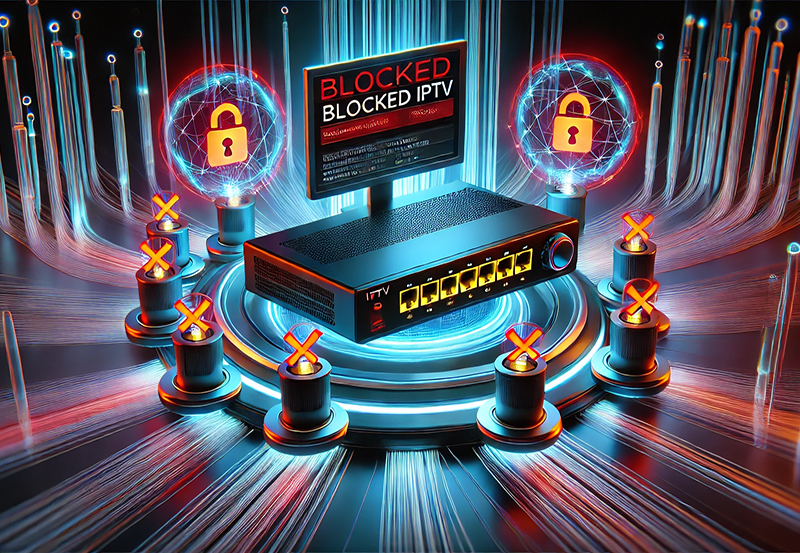The world of streaming is constantly evolving, and as more people turn to IPTV for their entertainment needs, ensuring optimal performance becomes a key concern. Knowing how router settings affect IPTV can greatly enhance your viewing experience. By diving into this topic, we aim to unveil practical insights to help you maximize the use of IPTV for services like IPTV Smarters and IPTV for UK users. Whether you’re a seasoned tech enthusiast or a curious beginner, this guide is crafted to cater to your understanding with clear, actionable information.
Understanding IPTV: The Basics
What is IPTV?
Internet Protocol Television (IPTV) is an alternative to conventional cable or satellite services, delivering TV content using the internet protocol over a packet-switched network such as the internet. But what makes IPTV stand out? Essentially, it allows for the uninterrupted flow of data, resulting in opportunities to watch television programs on a variety of devices, from a laptop to a smart TV, anywhere you have internet access. For enthusiasts and novices alike, IPTV continues to redefine how we perceive television, offering seamless content availability across devices.
IPTV Vs. Traditional Television
In contrasting IPTV with traditional television, the main difference lies in content delivery. While cable requires physical connections, IPTV relies solely on a stable internet connection. That being said, IPTV empowers users with on-demand viewing options that were previously unimaginable with conventional services. The shift to IPTV has opened up flexibility and choice, encouraging users to embrace a lifestyle aligned with what IPTV for UK residents and beyond can offer.
Pro Tip:
Get high-quality streams with Affordable IPTV services for a world-class viewing experience.
Key Advantages of IPTV for the Modern Viewer
The advantages are numerous. For starters, IPTV’s on-demand nature allows viewers to select programming at their convenience. It also supports a wide array of devices, so streaming isn’t locked to only one platform. Moreover, IPTV’s robust catalog of channels enhances user experience, as evidenced by the surge in popularity of IPTV Smarters among users seeking variety and quality. The field continues to evolve rapidly, promising even more engaging features shortly.
Router: The Heart of Your IPTV Experience
The Role of a Router in Streaming
A router serves as the central piece of your in-home network, directing data traffic between your devices and the internet. If you’re looking to optimize IPTV performance, understanding how your router functions is fundamental. Incorrect router settings can cause lags, buffering, or even complete disconnection from the IPTV service, making it crucial to ensure that these settings align with your viewing needs.
Why Router Settings Matter
Router settings can determine speed, security, and the overall efficiency of your network. By tweaking certain settings, these devices can help prioritize IPTV traffic, ensuring smooth, high-quality streams. Modern routers also come equipped with a variety of configurations such as Quality of Service (QoS), which can impact how bandwidth is allocated to different devices or services, including IPTV for UK users.
Identifying Common Router Problems
Despite the best efforts, router-related problems persist for many users. These can range from outdated firmware issues to interference from other devices on the same network. Too often, signals can be disrupted by walls and floors, weakening performance. Noticing the early signs of connectivity issues can help avert a full-fledged problem later. For IPTV viewers, addressing such challenges promptly can significantly leverage their watching experience.
Improving Router Settings for Optimal IPTV Performance
Prioritizing IPTV Traffic: Quality of Service (QoS)
Quality of Service (QoS) is a feature found on many routers that can prioritize internet traffic for specific services or devices. By enabling QoS for IPTV, users can ensure that their streaming content receives the bandwidth it requires, reducing interruptions and buffering times. Setting up QoS may vary depending on your router brand, but it’s generally accessible through the router’s admin panel, which can typically be reached by entering an IP address into your browser.
Configuring Bandwidth Allocation
With IPTV streaming, ensuring sufficient bandwidth becomes vital for a smooth experience. Bandwidth allocation allows you to define how much of your internet connection’s capacity is designated to IPTV services. This adjustment can greatly benefit households with multiple users or devices connected simultaneously, preventing streams from being throttled due to congestion.
Optimizing Wireless Signal Strength
In any streaming setup, wireless signal strength plays a crucial role. Positioning your router in a centralized location can help ensure that its signal reaches every corner of your home, thus minimizing potential dropouts or interference. For IPTV users, particularly those who use WiFi to connect their devices, boosting signal strength can dramatically improve viewing quality.
Utilizing Signal Extenders or Repeaters
For larger homes or spaces with challenging layouts, signal extenders or repeaters can be invaluable. These devices amplify the existing WiFi signal, granting connectivity to distant rooms or floors where reception might otherwise be poor. By strategically placing extenders, users can achieve a more stable, consistent IPTV stream without relying on sporadic, weak signals.
Picking the Right Internet Plan for IPTV
Choosing an Appropriate ISP Package
Identifying the right internet service plan is just as important as router optimization. The speed and quality of your IPTV streaming largely depend on the internet package you’re signed up for. Ensuring your internet plan meets the bandwidth demands of IPTV can safeguard against any performance pitfalls and enhance the streaming process significantly.
Matching Speed with Streaming Needs
Streaming IPTV content, particularly in high definition or 4K, requires substantial internet speeds. Ideally, a plan should offer a minimum speed of 25 Mbps for single-user households and 50 Mbps or more for multiple users to experience uninterrupted streaming. Assessing your needs against what an ISP offers can help you secure a plan that fully supports your IPTV activities.
Balancing Cost and Performance
With numerous ISP packages available, striking a balance between cost-effectiveness and performance is crucial. Often, cheaper plans can entice new subscribers, but these may lack the bandwidth needed to support seamless IPTV viewing. It’s wiser to invest in a package capable of handling your household’s streaming demands, ensuring that quality isn’t compromised for savings.
Advanced Router Settings for the Ultimate IPTV Experience
Exploring Firmware Upgrades
Router manufacturers frequently release firmware updates to address security vulnerabilities and enhance the device’s performance. Keeping your router’s firmware up-to-date is essential for maintaining IPTV performance. Updates can fix bugs, improve stability, and even offer new features that boost your streaming quality.
Enabling UPnP (Universal Plug and Play)
Universal Plug and Play (UPnP) allows devices to discover each other on the same network, making it easier to share data. Enabling UPnP on your router can facilitate smoother communication between your IPTV devices and service, reducing the likelihood of connection losses or disruptions during streaming sessions.
IP Address Management: Static vs. Dynamic
Assigning a static IP address to your IPTV device can enhance the stability of your connection by ensuring that it always uses the same network address. Contrary to a dynamic IP setup, which can change and reset connections, a static IP helps maintain unwavering connectivity, crucial for uninterrupted IPTV viewing.
Disabling Unnecessary Services
Disabling non-essential services or features such as WPS (Wi-Fi Protected Setup) can bolster both your network’s performance and security. A streamlined, less congested network environment directly benefits IPTV streaming, allowing more resources to be devoted to delivering a superior viewing experience.
Security Considerations for IPTV Streaming
Safeguarding Your Network
Network security remains a prime concern for any internet-based service, including IPTV. Protecting your streaming environment involves securing your router and network against unauthorized access, often achieved through robust encryption protocols and routinely updating passwords. This way, users can shield their IPTV device from uninvited guests.
Using Encryption for Secure Streaming
Encryption encrypts data before it is sent over the internet, making it more challenging for hackers to intercept and understand it. Employing WPA3 security on your router can enhance your network’s defense, ensuring that your IPTV content is protected from external threats with the latest encryption standards.
Recognizing and Avoiding Streaming Pitfalls
As enticing as streaming may be, users should be wary of potential streaming pitfalls. Unauthorized services, for instance, can jeopardize both network security and personal data. Opting for reputed IPTV providers both safeguards the integrity of your content and encourages healthy streaming practices.
Final Thoughts: Crafting the Perfect IPTV Setup
Charting out the ideal IPTV environment involves astutely balancing network performance, speed, and security. While the prospect may seem daunting at first, the impact of optimized router settings cannot be overstated. Embracing these strategies allows users to fully appreciate what IPTV brings to the table, inviting an immersive, next-level entertainment experience into their homes. As IPTV continues to evolve, ensuring your setup keeps pace is both a worthwhile investment and an exciting pursuit.
FAQs

What are the benefits of using IPTV for IPTV Smarters?
IPTV Smarters offers a convenient and comprehensive interface for accessing a wide range of IPTV content. It allows users to stream live TV, movies, and series effortlessly with its user-friendly design and features that enhance user experience immensely.
How can I improve my IPTV performance?
Improving IPTV performance involves several steps, such as optimizing router settings, prioritizing IPTV traffic with QoS, ensuring strong WiFi signals, and upgrading your internet plan if necessary. Keeping your network secure and your router firmware updated can also contribute to smoother streaming.
Why is my IPTV stream buffering frequently?
Frequent buffering can result from various factors, such as insufficient bandwidth, poor WiFi signals, or congested networks. Check if your router settings are optimized for IPTV and consider upgrading your internet plan or using wired connections to enhance stability.
Is IPTV legal in the UK?
IPTV services are legal in the UK as long as the content is licensed and distributed legally. Users should ensure they subscribe to trustworthy providers who comply with licensing agreements to avoid legal pitfalls while enjoying IPTV services.
Can I use a VPN with IPTV?
Many users choose to use VPNs with IPTV to enhance their online privacy and access geo-restricted content. It’s crucial, however, to select a reliable VPN that maintains fast speeds to ensure that streaming quality remains top-notch without significant slowdowns.
Will a mesh network improve my IPTV experience?
A mesh network can indeed improve your IPTV experience by extending WiFi coverage and providing stronger, more reliable connections throughout your home. By reducing dead zones, it enhances signal stability necessary for consistent, buffer-free streaming.
The Future of IPTV: What to Expect in the Coming Years





